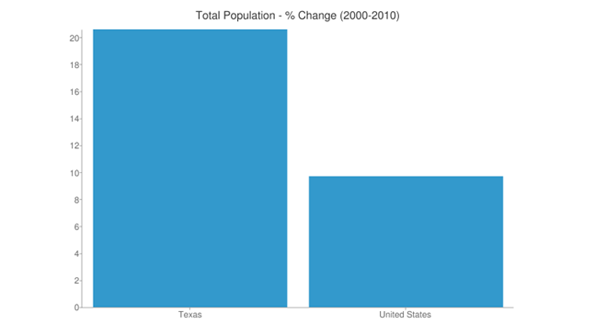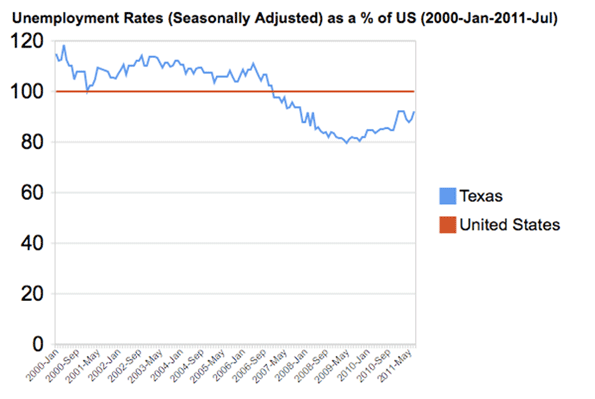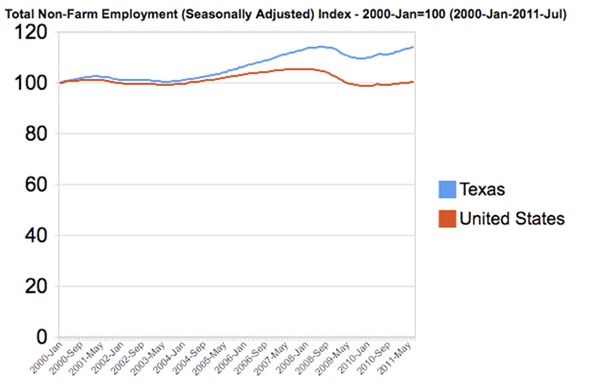These facts tell the story about the growth of good jobs under Perry not just minimum wage that some Republican candidates have been saying. People of this region of the Country know how well Texas has been doing and now that Oklahoma has passed some 'real' tort reform, we hope to be joining our neighbor to the south. Our unemployment has been dropping with the new jobs added to our state so we are starting to already see a difference. All those naysayers who were against our passing Right to Work can now shut up because if we were not a Right to Work state, we would not be joining Texas in job growth.
Governor Perry and Texas has shown the way and with our new Republican Governor Mary Fallin we are taking full advantage here in Oklahoma.
ConclusionWhile every statistic isn't a winner for Texas, most of them are, notably on the jobs front. And if nothing else, it does not appear that Texas purchased job growth at the expense of job quality, at least not at the aggregate level. There are certainly deeper places one might drill into and find areas of concern or underperformance, but that's true of everywhere. And these top line statistics are commonly used to compare cities and states. Unless Texas critics are ready to retire these measures from their own arsenal, it seems clear that Texas is a winner. The Texas story is real.Aaron Renn has done an excellent job in assembling the figures with the charts to make them easy to understand for anyone including this non-chart person.
The Texas Story Is Real
by Aaron M. Renn 09/19/2011
Texas Governor Rick Perry entered the Republican presidential nomination race bragging about the job creation record of Texas during his term as his primary pitch to a nation starved for jobs. This triggered a flurry of debate on whether or not Texas is really all Perry claims for it. But while there is certainly nuance in numbers, and Texas doesn't win on every single measure, on the whole it seems indisputable that Texas did very, very well during the 2000s.
This may or may not be the doing of Perry. Nor are the national struggles clearly the fault of Obama. The man at the top always reaps the credit for the blame for what happens on his watch, but the realities of the modern economy are quite complex and there's only so much influence a governor or president has – and that usually comes with a lag. Nevertheless, the Texas story can't simply be discounted.
Let's take a look at the top level data. While reviewing, keep in mind that the data for the US as a whole actually includes Texas. If you stripped the Texas data out of the US total, the comparisons would generally get even better for the Lone Star State.
Population
The root of the Texas story is in its massive population growth during the last decade. While historic growth champions like California stumbled, Texas powered ahead, adding 4.3 million new residents for a growth rate of 20.6% - double that of the 9.7% US average.
Unemployment
Despite challenging times at both the beginning and end of the decade, Texas actually managed to keep those people busy at work too. While it started out the decade with an unemployment rate above the US average, by decade's end, with population growth and all, it was well below it:
JobsOne reason Texas was able to keep its unemployment rate under control is that it added jobs – nearly a million between 2000 and 2010 in a nation that lost jobs during that period. The chart below, rendering the US and Texas on the same base, shows that the two moved closely in tandem during the first half of the decade, followed by an ever-widening gap in Texas' favor.
Excerpt: Read More at NewGeography.com Aaron M. Renn is an independent writer on urban affairs based in the Midwest. His writings appear at The Urbanophile, where this piece originally appeared. Telestrian was used to analyze data and to create charts for this piece.









No comments:
Post a Comment